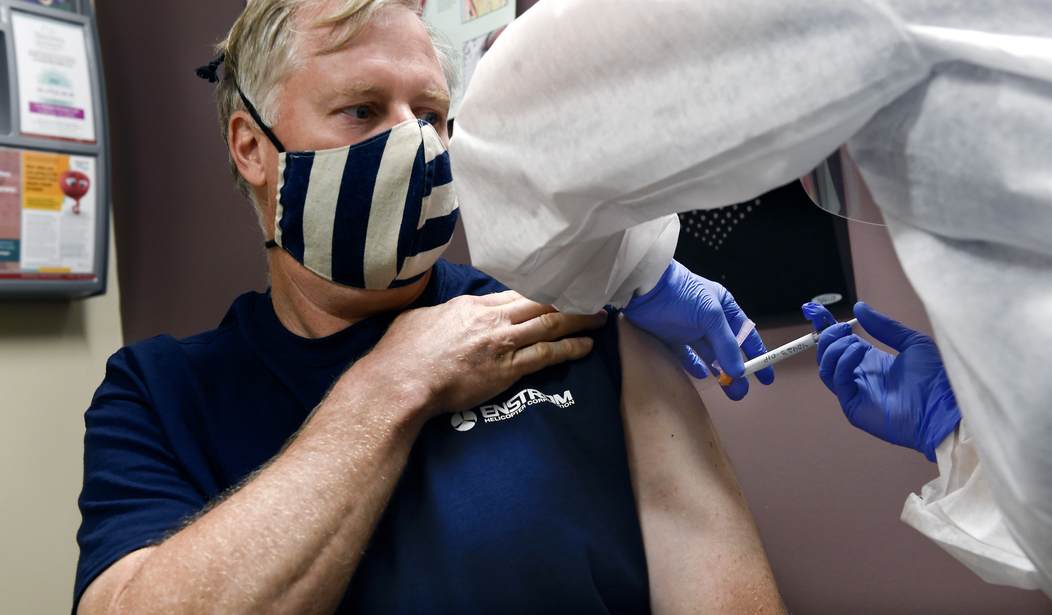Initial doses of the Pfizer COVID-19 vaccine are being given in the U.K., and it appears healthcare workers are some of the first to receive it. Regulators have issued a warning to people with severe allergic reactions. Those who have suffered an anaphylactic reaction, like those who carry an EpiPen, should not take this particular vaccine brand after two National Health Service (NHS) workers suffered reactions.
According to the Independent:
Professor Stephen Powis, national medical director for NHS England, said: “As is common with new vaccines, the MHRA have advised on a precautionary basis that people with a significant history of allergic reactions do not receive this vaccination after two people with a history of significant allergic reactions responded adversely yesterday.”
This means that anyone scheduled to receive the vaccine on Wednesday will be asked about their history of allergic reactions.
The updated MHRA advice states: “Any person with a history of a significant allergic reaction to a vaccine, medicine or food (such as previous history of anaphylactoid reaction or those who have been advised to carry an adrenaline autoinjector) should not receive the Pfizer/BioNtech vaccine.
This warning only applies to the Pfizer vaccine at this point. It’s unclear if the other manufacturers will have a similar warning as a precaution until the cause of the reactions is determined. According to the report, thousands of vaccines were given in the U.K. on Tuesday, and these are the only two reported reactions. The story notes the vaccine should only be administered in a setting where resuscitation equipment is available in case of a serious allergic reaction to any injection components.
Pfizer is assisting the Medicines and Healthcare Regulatory Agency (MHRA) with an investigation into the causes. Both a Pfizer spokesperson and Dr. June Raine, chief executive of the MHRA, said this reaction was not a feature in extensive clinical trials.
However, as with all new treatments, the risk of finding new adverse reactions increases with broader use. This finding will undoubtedly cause debate over making the vaccine mandatory or a pre-condition to engage in certain services. Vaccinations have long been debated in the United States, and it is only natural that the ones for COVID-19 will come up for similar discussion.
This is likely to be fueled by health experts stating that vaccination does not change the need for masking and social distancing. It’s likely to be further energized by comments like the one from the Pfizer chairman, Albert Bourla, in an appearance on Dateline NBC:
Albert Bourla told NBC’s “Dateline” that more studies had to be done into whether someone who had been vaccines could still transmit the coronavirus.
Host Lester Holt asked Bourla: “Even though I’ve had the protection, am I still able to transmit it to other people?”
Bourla then responded: “I think this is something that needs to be examined. We are not certain about that right now with what we know.”
The latest research shows the potential for a robust long-term immune response in recovered patients. This is consistent with what has been observed in COVID-19’s first cousin, SARS. Research has also demonstrated cross-reactive immunity in people who have been exposed to other coronaviruses.
Similar findings were made during the H1N1 pandemic, which caused the CDC and the WHO to change their response to the virus (emphasis mine):
In late 2009, months after the World Health Organization declared the H1N1 “swine flu” virus to be a global pandemic, Alessandro Sette was part of a team working to explain why the so called “novel” virus did not seem to be causing more severe infections than seasonal flu.
Their answer was pre-existing immunological responses in the adult population: B cells and, in particular, T cells, which “are known to blunt disease severity.” Other studies came to the same conclusion: people with pre-existing reactive T cells had less severe H1N1 disease. In addition, a study carried out during the 2009 outbreak by the US Centers for Disease Control and Prevention reported that 33% of people over 60 years old had cross reactive antibodies to the 2009 H1N1 virus, leading the CDC to conclude that “some degree of pre-existing immunity” to the new H1N1 strains existed, especially among adults over age 60.
The data forced a change in views at WHO and CDC, from an assumption before 2009 that most people “will have no immunity to the pandemic virus” to one that acknowledged that “the vulnerability of a population to a pandemic virus is related in part to the level of pre-existing immunity to the virus.” But by 2020 it seems that lesson had been forgotten.
To date, similar findings have not changed anything about the COVID-19 response. However, given what has been observed to date, it is completely rational and in line with available science for people who have recovered from COVID-19 to question their need for a vaccine, as well as continued precautions. It is also reasonable for the general population to want an available test for pre-existing immune responses before being vaccinated.
The debate should not be classified as pro-vaccine and anti-vaccine. Rather, it should center on who should get vaccinated and how often. The risk in rushing to require everyone to take it is highlighted by the allergic reactions the NHS notes on the first day of the vaccine’s generalized use.












Join the conversation as a VIP Member